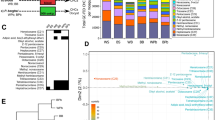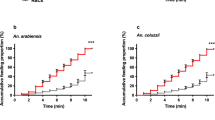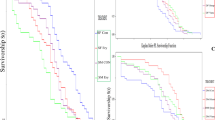Abstract
DURING the course of some studies originally designed to evaluate the role of certain cations and anions in influencing the susceptibility of Aedes aegypti to infection with Plasmodium gallinaceum, it became apparent that the calcium fed to these mosquitoes was also consistently inhibiting digestion of the ingested blood meal in a fairly constant proportion of the mosquitoes. This report extends this observation somewhat, and deals with some preliminary experiments on the inhibitory effects of the cations calcium and magnesium, alone and in combination with the antibiotic oxytetracycline, on the process of blood digestion in the mosquito A. aegypti.
This is a preview of subscription content, access via your institution
Access options
Subscribe to this journal
Receive 51 print issues and online access
$199.00 per year
only $3.90 per issue
Buy this article
- Purchase on Springer Link
- Instant access to full article PDF
Prices may be subject to local taxes which are calculated during checkout
Similar content being viewed by others

References
Weinberg, E. D., Bact. Rev., 21, 46 (1957).
Author information
Authors and Affiliations
Rights and permissions
About this article
Cite this article
TERZIAN, L. Inhibition of Blood Digestion in Mosquitoes by Cations, and Cation–Antibiotic Mixtures. Nature 181, 282–283 (1958). https://doi.org/10.1038/181282a0
Issue Date:
DOI: https://doi.org/10.1038/181282a0
This article is cited by
-
Spores of microorganisms X. Interference of tetracycline antibiotics with sporogenesis of Bacilli
Folia Microbiologica (1962)
Comments
By submitting a comment you agree to abide by our Terms and Community Guidelines. If you find something abusive or that does not comply with our terms or guidelines please flag it as inappropriate.


